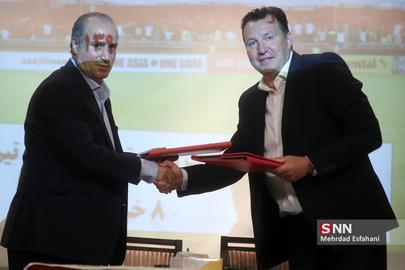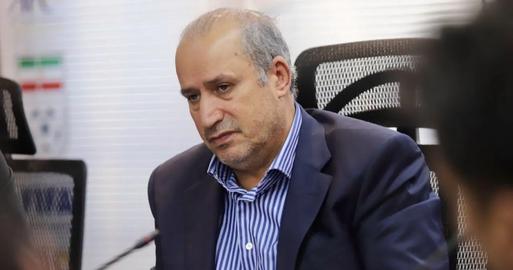This article is part of a 22-part miniseries on the history and stars of Iranian football released ahead of Iran's participation in Group B of the 2022 Qatar World Cup in November. You can explore the rest of the series here.
In 2019, Carlos Queiroz stepped down as the head coach of the Iranian national football team after eight years of coaching, blighted by numerous fallouts with government and sports officials. Maziar Nazemi, a former state TV presenter and head of media at the Ministry of Sports, reacted by writing his Twitter account: "We will rise more gloriously again. The world’s greatest coaches are lining up to negotiate with Iranian football.”
Among the names Nazemi claimed were “lining up” for the top job were Jose Mourinho, Jürgen Klinsmann, and Zinedine Zidane. But on May 22 of that year, it was instead the Belgian manager and ex-midfielder Marc Wilmots who was introduced as the new head coach of Team Melli.
Wilmots had previously managed Schalke FC in Germany on a temporary basis, Sint-Truidense in Belgium, and the national teams Belgium and the Ivory Coast. His very short stint in Iran, however, is remembered not for anything football-related but for an infamous dispute now known in Iran as “WilmotsGate”: one that also shed pivotal light on the corrupt financial activities of Federation chief Mehdi Taj.
At the time the contract was signed, the Iranian Football Federation trumpeted a claim that the new head coach had come onboard for less than a million dollars. Taj himself appeared on state TV to celebrate the same. At the time, the website Transfermarkt estimated Marc Wilmots' annual salary at 600,000 to 800,000 dollars, making all this sound perfectly plausible.
It was, however, not the truth. Wilmots left that December after just six matches over what he termed “serious contractual violations”. Iranian state news agencies then reported that in fact, Wilmots had had a three-year contract worth 6.2 million euros, signed by Mehdi Taj on the effective orders of Masoud Soltanifar, the then-Minister of Sports, whom Carlos Queiroz had accused of being behind his own dismissal.
It was also reported that the terms had been agreed on the advice of a body called the Iran-Netherlands Trade and Cultural Center, an Iranian government-backed initiative based in The Hague. Its director was later named as Mazyar Tashakori Timjani, whom previous reports by Iran’s ISNA and Tabnak News Agencies had already identified as a close associate of Soltanifar. Timjani in turn had been appointed thanks to Soltanifar, in his previous tenure as Culture Minister.
This bizarre closed set of communications aside, the contract signed by Mehdi Taj – himself a former IRGC Intelligence commander in the 1980s – was, it emerged, wholly unconventional. For one thing, it stated that were the contract terminated by either party, Wilmots would be entitled to what was described as “a certain amount”. That amount was the entire value of the contract up until the end of its term.
Since the Belgian left Iran, FIFA has examined his complaint and unsurprisingly ordered Iran to pay him 6.2 million euros: close to a million for each month he spent with the national team. In July this year the Court of Arbitration for Sport (CAS) ruled that Iran had to pay him an additional 3.25 million euros in compensation.
The scandal kept escalating. In May 2021 the Federation lost its head office in Iran due to a failure to clear debts with Wilmots. In November 2019, it was reported, Mehdi Taj had “borrowed” some 2 million euros from Iran’s Social Security Investment Company (SSIC, or Shasta, Iran’s largest holding company, responsible for state pension funds) in order to pay part of Wilmots’s wages.
For his part, Taj stepped down from his role as head of the Federation on December 29, 2019. When FIFA’s order to pay Wilmots back came through, he appeared on the state broadcaster’s sports channel Varzesh-3 to belligerently absolve himself of any blame: “Has the big money that disappeared from ministers’ accounts ever been reimbursed by them? So then, why should I pay Wilmots from my account?”.
The seizure of Federation assets by Shasta was also lambasted by current Federation officials, who said the investment company itself had questions to answer about the loan. The fallout drags on to this day, at a time when Iranian pensioners have been taking to the streets to protest over the pittance offered to them by the state.
visit the accountability section
In this section of Iran Wire, you can contact the officials and launch your campaign for various problems






















comments